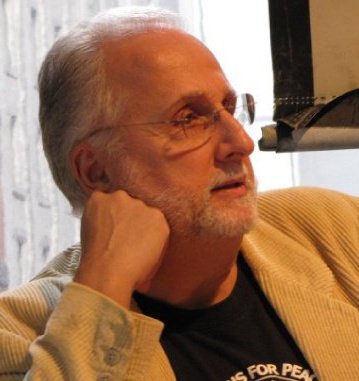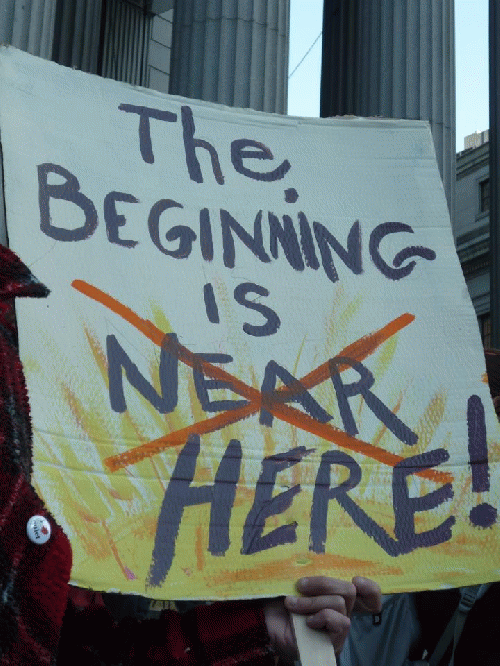I had asked my classes the week prior if anyone knew what the Occupy Wall Street movement was about and whether anyone had been downtown to Liberty Square. Most seemed to have some vague familiarity with the occupation, either from hearing about it from other students, seeing it on TV, or reading about it in the newspapers. Only one student had actually visited the Square, and he only once. So when I heard about the planned student walk-out, despite my doubt whether many if any of my students would answer the call, I decided to pre-empt the boycott and hold my classes at Liberty Square.
As the day approached I was curious whether other faculty members, especially some I knew to be politically and socially active and aware, had considered doing the same. Upon discussing my plans with them, some thought it an interesting idea but expressed very real and practical concerns regarding insurance issues, police response (students and others had already been pepper sprayed and hundreds arrested), whether the college administration would approve, whether parents who may not sympathize with the movement would be outraged, etc. Though I had discussed my plans with one of my Department Co-chairs, who was supportive, I have to admit that I hadn't thought through all of these important pragmatic details which clearly convinced other, perhaps more thoughtful, faculty members, to play it safe and remain in the classroom. These were real and perhaps job threatening concerns, but my excitement with exposing my students to what I considered to be a valuable learning experience , a "classroom" in the midst of an important and historic event, overrode my anxiety and perhaps, my better judgment. Let others read about it afterwards from the safety of their classrooms, we are going to Liberty Square to observe, to question, to discuss, and most importantly, to learn firsthand from the people who are making history. Let the details be damned!
When we arrived at the Square, my instructions to the students was first to get a "feel" of the place, to spend the first hour of our three hour class circulating around, to observe how the "encampment" was set up, to talk to the occupiers and to visitors, to try to determine why they were there, what they hoped to accomplish, and how. I suggested, as well, that they politely approach a "friendly" police officer, explain that this was a class assignment, and ask his/her impressions of the occupation.
As I walked around the Square, I saw several students speaking with activists, others watching an artist painting a canvas, still others listening to a makeshift ensemble playing music, and a few sampling a piece of vegetarian pizza, termed "occu-pie," at the encampment kitchen. At the specified time we came together as a class, found an available space in the busy park, and sat down on the concrete floor to begin our discussion.
Needless to say, most of the students loved what they described as the festival-like atmosphere and were impressed with what they had seen, the organization of the encampment, the friendliness of everyone they encountered, the willingness of the activists, bystanders, and passersby to discuss their perspectives and experiences. They were especially impressed with the human microphone system of repeating announcements so everyone throughout the park would know what was being said and what was going on (an ingenuous innovation made necessary when loud speakers and bull horns were prohibited by the police). The dialogue then took an analytic turn as I mentioned to the students how many in the mainstream media had described the Occupy Wall Street movement as chaotic and lacking demands. I asked them if they agreed with the media's assessment or, if not, what they believed the purpose and goals to be. Some thought it was about Wall Street corruption, others about jobs, home forecl osures, healthcare, tuition hikes, and school loans, the whole gamut of very pragmatic and existential economic issues that concerns young and old alike. One student mentioned that obviously the mainstream media was either not paying attention or trying to discredit the occupation as all of these sounded very much like demands to him. As we continued our discussion our ranks began to swell with the activists and bystanders who had been quietly listening, now becoming active participants in the dialogue. Many related their personal stories about what had brought them to Liberty Square, and why they were willing to endure the discomfort of sleeping on the ground, oftentimes in the rain. The interaction was enthralling and all involved were interested and engaged, even students who in the classroom had been rather quiet and withdrawn.
Being a philosopher, this experience of vibrant dialogue and intelligent, spirited interaction, in a park environment brought to mind what it must have been like in ancient Athens, when citizens, including the great philosopher Socrates, came together to discuss important moral, political and civic issues. Today, I thought, over two thousand years later, Liberty Square had become the Agora, a gathering place for citizens to meet and to discuss what is right, what is just, and what is good.
As we approached the end of our time together, I asked the circle what "victory" in this struggle would look like. Some said an end to Wall Street corruption, arresting Wall Street criminals rather than demonstrators, and taxing millionaires. Others said single payer healthcare, ending home foreclosures, forgiving student loans, and free education. Still others said ending the wars, bringing the war dollars home, creating jobs and putting people back to work. As I listened to the discussion seated on the concrete floor in the middle of this very busy park crowded with courageous and enthusiastic people of all ages coming together at last to raise their voices in behalf of justice, fairness, peace, equality, concern for others and the environment, I realized that however this occupation may end, an amazing victory has already been achieved. The PEOPLE are taking to the streets here and all over the country, the spark has been lit, voices are being raised, demands are being mad e and there will be no going back.
As we ended the dialogue, students, bystanders, and activists spoke of how they enjoyed the interaction and how important it was for people, all people, to sit face to face and discuss rationally and lovingly the problems we face and possible solutions. As we began to depart from our makeshift classroom, everyone embraced in recognition and in appreciation of the valuable experience we had shared.
As I made my way back to the college, I knew I had made the right decision to hold my classes at the Square, and was very glad I had "taken the risk," not only because this is an important historical event and what education is truly about, but because I was personally encouraged that the gauntlet has been passed to a new generation of concerned and informed activists and that there is still hope for America, nay for humankind.






